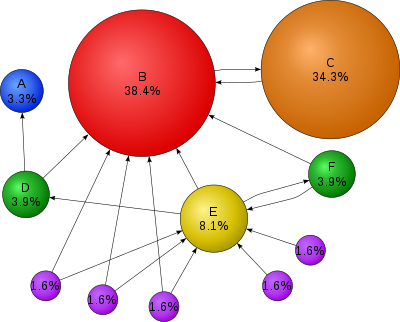The best tool for understanding where music comes from is evolutionary biology. Songs don’t spontaneously spring into being any more than animals or plants do. They evolve, descending from reshuffled pieces of existing songs, the way our genes are shuffled together from our parents’ genes. The same way that all life has a single common ancestor, all human music has a shared origin in the calls of our primate forebears.
I’m speaking on a panel
Fan Wars: Copyright vs. Mash-ups and Fan Fiction
Many mash-up artists seem unaware that their work implicates any rights at all, and copyright owners may be reluctant to alienate fans with copyright restrictions. Artists such as Girl Talk remain outspoken against copyright restrictions on mash-up culture. Individual copyright owners, such as the owners of Star Wars, have adopted terms of use for mash-ups.
Is fan and other mash-up activity important to enrich our culture? Are existing allowances for fair use adequate? Should mash-up artists and fan fiction publishers have any right (legal or moral) to complain when others copy and redistribute their work? What is a copyright owner or licensee to do when it has contractual obligations to third parties in connection with their contributions? How should these issues be resolved?
Le Freak, c’est chic
Meet guitarist and producer Nile Rodgers, one of my favorite musicians in the world. He founded Chic along with the late bassist Bernard Edwards, and he’s on Twitter.
Nile Rodgers has led an action-packed life. As a teenager, he played with the Sesame Street band, and then with the Apollo Theater house band, where he backed such luminaries as Aretha Franklin and P-Funk. He was an active Black Panther. His Allmusic bio lists various NYC bands he played in before forming Chic, including a new wave rock outfit called Allah & The Knife Wielding Punks. He later went on to write most of the disco songs and eighties pop hits that I like, and helped lay the cornerstone of hip-hop. He deserves a blog post and then some.
Authenticity
When I was younger I was obsessed with authenticity in music. I wouldn’t even play electric guitar because it felt too easy, like cheating somehow. I expended a lot of energy and attention trying to figure out what is and isn’t authentic. Now, at the age of 34, I’ve officially given up. I doubt there’s even such a thing as authenticity in music, at least not in America. There’s just stuff that I enjoy hearing, and stuff I don’t. But the concept of authenticity meant a lot to me for a long time, and it continues to mean a lot to many of the musicians and music fans I know. So what is it, and why do people care about it?
At various points in my quest, I thought I had identified some truly authentic musical forms and styles. Here they are, more or less in order of my embracing them.
Sixties Motown
When I was growing up, my mom and stepfather had the Big Chill soundtrack in heavy rotation. You could equate authenticity with soul, and there’s plenty of soul here.
In the eighties, my parents’ friends liked to praise the classic Marvin Gaye and Aretha Franklin recordings on this soundtrack as “pure,” by contrast to the music of the then-present: hip-hop, synth-heavy pop, Michael Jackson. I dutifully accepted this formulation, even though my ears told me to like the eighties stuff as much as the sixties stuff. Continue reading “Authenticity”
The case for sampling
My friend Adam, a non-musician but devoted music fan, asked me why sampling is good. He’s used to hearing me defend sampling from the accusation that it’s bad, but he’d never heard a positive argument for it. In case you’ve ever asked the same question, here’s my answer.
Continue reading “The case for sampling”
Imogen Heap and artificial harmony
Here’s a live rendition of Imogen Heap’s song “Hide And Seek.”
Copyright Criminals
This PBS Independent Lens documentary on sampling culture is a good one, and you can watch the whole thing on Youtube. Their resources and links page includes my Biz Markie blog post. Thanks Beautiful Decay for posting the videos.
Bloom County and Michael Jackson
A little late but it took me this long to track down: Steve Dallas channels the King of Pop. Thanks Adam G for scanning this from his extensive Bloom County collection and sending it. Click for full size.
Apache makes you go hmmm
DJ Kool Herc describes “Apache” by The Incredible Bongo Band as the national anthem of hip-hop. “Apache” includes a famous drum and percussion break that has reliably put bodies on the dance floor through hip-hop’s prehistory:
[audio:http://www.ethanhein.com/music/Apache_loop.mp3]How to get web traffic from Google
If you want to get your web page noticed but don’t want to spend a lot of money on advertising, your best bet is search engine optimization, or SEO. As of this writing, that mostly means understanding how Google ranks search hits, and adapting your web presence accordingly.
Historically, search engine results were ranked based on the frequency and proximity of keywords in the page text. But as the web grows, there are tons and tons of pages out there with the same or similar keywords. Any Google search on any remotely mainstream topic is going to return thousands and thousands of hits, most of which are useless to you. Another problem is that the keyword system is easy to game. Unscrupulous web designers can load up a page with invisible keywords repeated over and over, by putting them in the same color as the background off to the side of the page.
To make its results more useful, Google tries to rank its keyword-based search results in the order of their relevance. They do this using a complex proprietary algorithm called PageRank, the real heart of their search engine. One of PageRank’s most heavily weighted factors is the number of links pointing to a page. If more people link to your site, presumably that’s because it’s more useful or authoritative. PageRank also recursively factors in the number of links going into those pages that link to you.
So the key to a higher Google rank is getting other pages to link to you. The question is, how do you get those precious inbound links?







